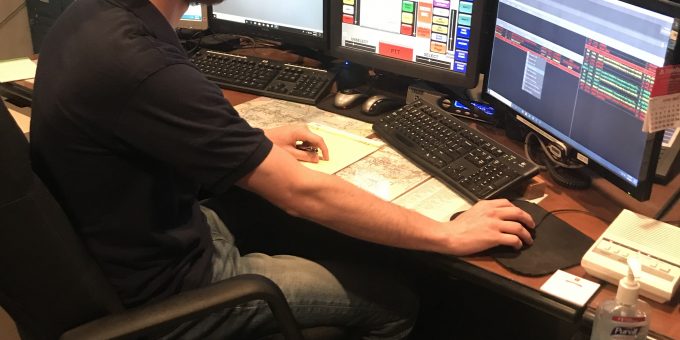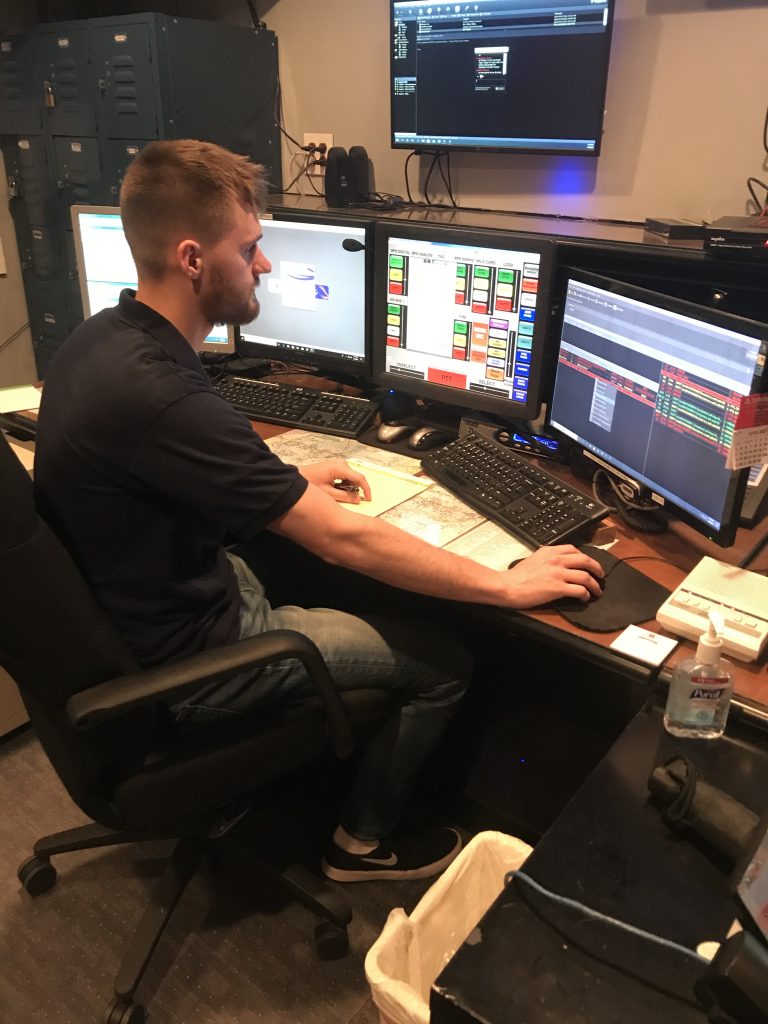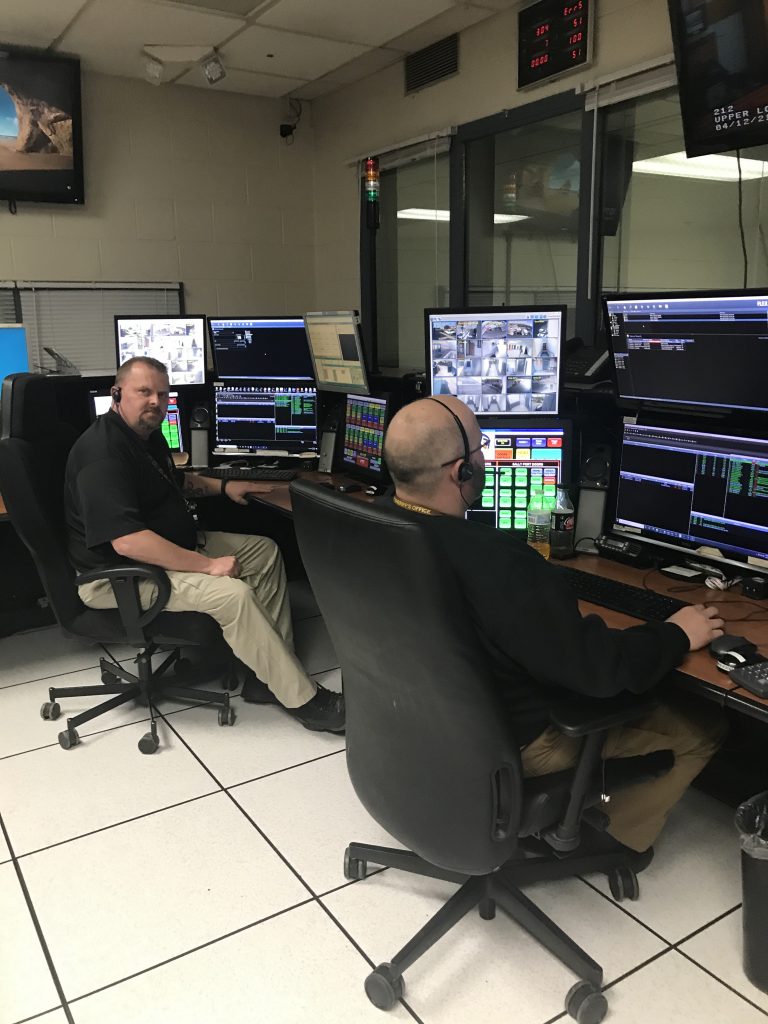
LAWRENCE CO. – The unsung heroes of emergencies are 9-1-1- dispatchers, who work behind the scenes and get very little recognition.
Whether it is a police, fire, or medical emergency situation, the first person that handles an emergency is call the 9-1-1 dispatcher. He or she provides professional service and tries to keep the caller calm while obtaining important information to give to emergency responders.
National Telecommunicators Week is April 11th – April 17th this year. WBIW reporting staff interviewed a few local 9-1-1 dispatchers to learn about their profession and what it is like to deal with emergencies.
Bedford Police Department has seven full and part-time dispatchers, who have fielded more than 38,020 calls last year in their dispatcher center.

Dispatchers have been trained to handle all types of emergencies. They run driver license and plate numbers for responding officers, page out fire departments and ambulances, all while dealing with multiple phone lines ringing to include the 911 emergency line.
Sometimes there is only one dispatcher on duty at Bedford Police Department to manage the phone calls, police officers requesting information over the radio, and dealing with the 9-1-1 caller that is already on the line.
The job can be stressful at times and not everyone is up to the task of being a telecommunicator.
The training for a telecommunicator for Bedford Police Department is approximately three to six months.
“Our training is very extensive, learning how to use the radio, Spillman law enforcement system, and the IDAC system to run drivers licenses and plates,” said Landon Jones a six-year telecommunicator for Bedford Police.
There are calls that are forever in the minds of the 9-1-1 caller especially for Landon Jones who fielded a call from a fatal accident on 5th Street in Bedford and knew the person that had died.
Other times 9-1-1 is abused and people use it to find out such things like numbers for local restaurants or school children who call about their day. During weather events, the dispatch center is flooded with phone calls about downed trees or powerlines or reports of flash flooding.
Jones has been a telecommunicator since February 2016.
“My father (Kevin Jones) has been at the Bedford Police Department for almost 33 years, and just growing up in that environment and a lot of family in law enforcement. I saw this as an opportunity to get involved in law enforcement myself,” Jones added.

The Lawrence County 9-1-1 Central dispatch is just as busy, telecommunication officers fielded 11,354 emergency calls, 65,012 administrative calls, with 533 of those calls were texts to the dispatch center.
There is a total of six 9-1-1 lines and seven administrative lines that the Lawrence County 9-1-1 Central dispatch center is responsible for.
The eleven dispatchers are trained to deal with all the emergencies that come through the center.
Typically 2 to 3 dispatchers per shift, with the capability for 5 dispatchers, are scheduled to be on duty at one time when needed.
Dispatchers can be on a call for as long as 20-30 minutes giving CPR instructions to a 9-1-1 caller.
A dispatcher asks the caller a set of questions, based on answers the caller gives them and the type of emergency. The dispatcher is scripted in what information to give to the 9-1-1 caller.
Lawrence County 9-1-1 dispatchers recommend those with various health issues to sign up for SMART 9-1-1 which automatically gives information to dispatchers when they call 9-1-1. This includes the caller’s current health issues, medications, and any other information that the caller puts into the system.
“In my almost fifteen years as a dispatcher, things have changed. Including the call volume, technology, and the way 9-1-1 calls are handled from texting an emergency to giving how to handle medical emergencies over the phone,” said Captain Mark Jones Lawrence County 9-1-1 Central Dispatch.
“The calls dealing with children are always the hardest. There are times you want to get in your pickup and go help, but as a dispatcher, you just make sure the help arrives quickly as possible providing as much information to the responders as possible,” said Lt. John Keith a seven year veteran of Lawrence County Central dispatch.
The dispatch center can go from relative calm to chaos in a matter of minutes. One vehicle accident on State Road 37 may generate 6-10 calls at the same time into the dispatch center.
Between dealing with a medical emergency, there may be other emergencies already taking place from a house fire to a burglary in progress that can keep the two dispatchers with their hands full.
In those situations, they work together in obtaining the information from the callers, while the other dispatcher is relaying the information to responders.
Calls are sometimes rolled over to Bedford Police Department after six rings should the dispatch center get flooded with 9-1-1 calls, especially during weather events.
“I have been an EMT for a long time and went to paramedic school and my wife is a nurse. We both have been in the medical field, but it was not feasible for me to work the road so I got involved in being a dispatcher and just stayed,” said Keith.
“I was on Huron Volunteer Fire Department for 20 years, and gave that up, but decided to continue to be in public service,” said Capt. Mark Jones.
“Once you start, you end up staying in some form of public service,” said Lt. Keith.
Bedford Police Department 9-1-1 dispatchers include:
- Cassie Ratliff
- Tamara Duckett
- Landon Jones
- Courtney Ramsay
- David Matthews
- Edith King
- Cassie Terry
The eleven dispatchers at Lawrence County Central Dispatch 9-1-1 Center include:
- Betty Jo Eldrich
- Ron Haines
- Scott Smith
- Chad Hillenburg
- Manessa Bush
- Floyden Mugford
- Shaun Kinser
- Amy Trueblood
- Tyler Phillips
- Capt. Mark Jones
- Lt. John Keith.



